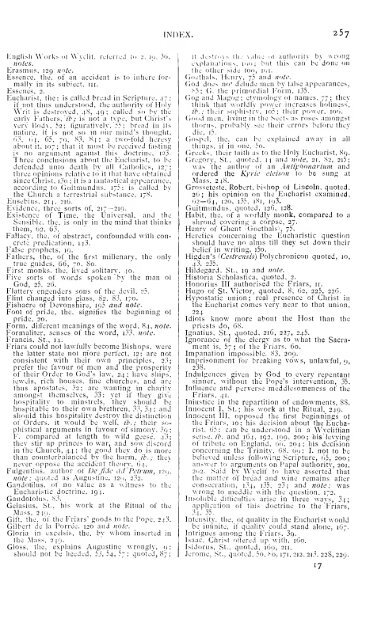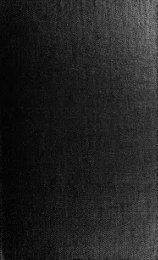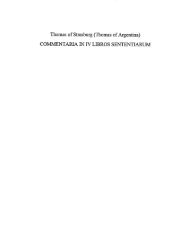You also want an ePaper? Increase the reach of your titles
YUMPU automatically turns print PDFs into web optimized ePapers that Google loves.
English Works ol Wyclif,<br />
notes.<br />
referred to 3, ig<br />
Erasmus, 129 note.<br />
Essence, the, of an acci<strong>de</strong>nt is to inhere formally<br />
in its subject, in.<br />
Essenes, 2.<br />
Eucharist, the; is called bread in Scripture, 47;<br />
if not thus un<strong>de</strong>rstood, the authority of Holy<br />
Writ is <strong>de</strong>stroyed, 48, 49 called so ; by the<br />
early Fathers, ib; is not a type, but Christ's<br />
very Body, 52; figuratively, 55; bread in its<br />
nature, it is not so in oiir mind's thought,<br />
63, 64, 65, 70, 83, 84; a two-fold heresy<br />
about it, 107; that it must be received fasting<br />
is no argument against this doctrine, n3.<br />
Three conclusions about the Eucharist, to be<br />
<strong>de</strong>fen<strong>de</strong>d unto <strong>de</strong>ath by all Catholics, 127;<br />
three relative to it that<br />
opinions<br />
have obtained<br />
since Christ, i3o it is a fantastical ; appearance,<br />
according to Guitmundus, 175; is called by<br />
the Church a terrestrial substance, 178.<br />
Eusebius, 214, 216.<br />
Evi<strong>de</strong>nce, three sorts of, 217—219.<br />
Existence of Time, the Universal, and the<br />
Sensible, the, is only in the mind that thinks<br />
them, 62, 63.<br />
Fallacy, the, of abstract, confoun<strong>de</strong>d with concrete<br />
predication, i|3.<br />
False prophets, 19.<br />
Fathers, the, of "the first millenary, the only<br />
true gui<strong>de</strong>s, 66, 70, 80.<br />
First monks, the, lived solitary, 40.<br />
Five sorts of words spoken "by the man of<br />
God, 25, 26.<br />
Flattery engen<strong>de</strong>rs sons of the <strong>de</strong>vil. 25.<br />
Flint changed into glass, 82, 83, 170.<br />
Fishacre of Devonshire, 195 and note.<br />
Foot of pri<strong>de</strong>, the, signifies the beginning of<br />
pri<strong>de</strong>, 20.<br />
Form, different meanings of the word, 84, note.<br />
Formaliter, senses of the word, i33, note.<br />
Francis, St., 14.<br />
Friars could not lawfully become Bishops, were<br />
the latter state not more perfect, 12; are not<br />
consistent with their own principles, 23;<br />
prefer the favour of men and the prosperity<br />
of their Or<strong>de</strong>r to God's law, 24; have ships,<br />
jewels, rich houses, fine churches, and are<br />
thus apostates, 32; are wanting in charity<br />
amongst themselves, 33; yet if they give<br />
hospitality to minstrels, "they should be<br />
hospitable to their own brethren, 33, 34; and<br />
should this hospitality <strong>de</strong>stroy the distinction<br />
of Or<strong>de</strong>rs, it would "be well", ib.; their so-<br />
phistical arguments in favour of simony, 39;<br />
F. compared at length to wild geese, 43;<br />
they stir up princes to war, and sow discord<br />
in the Church, 44; the good they do is more<br />
than counterbalanced by the harm, ib.; they<br />
never oppose the acci<strong>de</strong>nt theory, 64.<br />
Fulgentius, author of De fi<strong>de</strong> ad'Petrum, 129,<br />
note; quoted as Augustine, 129, 232.<br />
Gandofilus, of no value as a witness to the<br />
Eucharistic doctrine, 194.<br />
Gandofolus, 83.<br />
Gelasius, St., his work at the Ritual of the<br />
Mass, 249.<br />
Gift, the, of the Friars' goods to the Pope, 243.<br />
Gilbert <strong>de</strong> la Porree, 120 and note.<br />
Gloria in excelsis, the, by whom inserted in<br />
the Mass, 249.<br />
Gloss, the, explains Augustine wrongly, 9;<br />
should not be hee<strong>de</strong>d, 53, 54, 57; quoted, 87;<br />
INDEX. 257<br />
it<br />
<strong>de</strong>stroys<br />
the value ol authority by wrong<br />
explanations. 190; but this can be done on<br />
the other si<strong>de</strong> too, 191,<br />
Goethals, Henry, 75 and note.<br />
God does not <strong>de</strong>lu<strong>de</strong> men by false appearances,<br />
85; (i. the primordial Form, i35.<br />
Gog and Magog; etymology of names, 77; they<br />
think that worldly power increases holiness,<br />
ib.} their 10? their ; sophistry, power. 106.<br />
Good men, living in the Sects as roses amongst<br />
thorns, probably see their errors before they<br />
die, i5.<br />
in all<br />
Gospel, the, can be explained away<br />
things, if in one, 5o.<br />
Greeks, their faith as to the Holy Eucharist, 89.<br />
Gregory. St., quoted, 14 and note, 21, 82, 2i5;<br />
was the author of an Antiphonarium and<br />
or<strong>de</strong>red the Kyrie eleison to be sung at<br />
Mass, 2 18.<br />
Grosseteste, Robert, bishop of Lincoln, quoted,<br />
26; his opinion on the Eucharist examined,<br />
62—64, 120, i35, 181, ig3.<br />
Guitmundus, quoted, 126, 128.<br />
Habit, the, of a worldly monk, compared to a<br />
shroud covering a corpse, 27.<br />
Henry of Ghent (Goethals), 73.<br />
Heretics concerning the Eucharistic question<br />
should have no alms till they set down their<br />
belief in writing, i5o.<br />
Hig<strong>de</strong>n's (Cestrensis) Polychronicon quoted, 10,<br />
43, 235.<br />
Hil<strong>de</strong>gard, St., and note.<br />
19<br />
Historia Scholastica, quoted, 2.<br />
Honorius III authorised the Friars, n.<br />
Hugo of St. Victor, quoted, 8, 62, 225, 226.<br />
Hypostatic union; real presence<br />
of Christ in<br />
the Eucharist comes very near to that union,<br />
224<br />
Idiots know more about the Host than the<br />
priests do, 68.<br />
Ignatius, St., quoted, 216, 227, 245.<br />
Ignorance of the clergy as to what the Sacra-<br />
ment is, 57 ; of the Friars, 60.<br />
Impanation impossible. 83, 209.<br />
Imprisonment for breaking vows, unlawful, 9,<br />
238.<br />
Indulgences given by God to every repentant<br />
sinner, without the Pope's intervention, 35.<br />
Influence and perverse meddlesomeness of the<br />
Friars, 41.<br />
Injustice in the repartition of endowments, 88.<br />
Innocent I, St.; his work at the Ritual, 249.<br />
Innocent III, opposed the first beginnings of<br />
the Friars, 10; his <strong>de</strong>cision about the Eucharist,<br />
65; can be un<strong>de</strong>rstood in a Wycliffian<br />
sense, ib. and 164, 192, 199, 200; hislevying<br />
of tribute on England, 66, 204; his <strong>de</strong>cision<br />
concerning the Trinity, 68. 69; I. not to be<br />
believed unless following Scripture, 65, 200;<br />
answer to arguments on Papal authority, 201,<br />
202. Said by Wyclif to have asserted that<br />
the matter o"f bread and wine remains after<br />
consecration, 134, i35, 23.(. and note; was<br />
wrong to meddle with the question, 172.<br />
Insoluble difficulties arise in three ways, 34;<br />
application of this doctrine to the "Friars,<br />
34 , 35.<br />
Intensity, the, of quality in the Eucharist would<br />
be infinite, if quality could stand alone, 167.<br />
Intrigues among the Friars, 39.<br />
Isaac, Christ offered up with, 160.<br />
lsidorus, St., quoted, 169, 211.<br />
Jerome, St., quoted, 5o, 80, 171, 212, 2i3, 228, 229.<br />
17

















